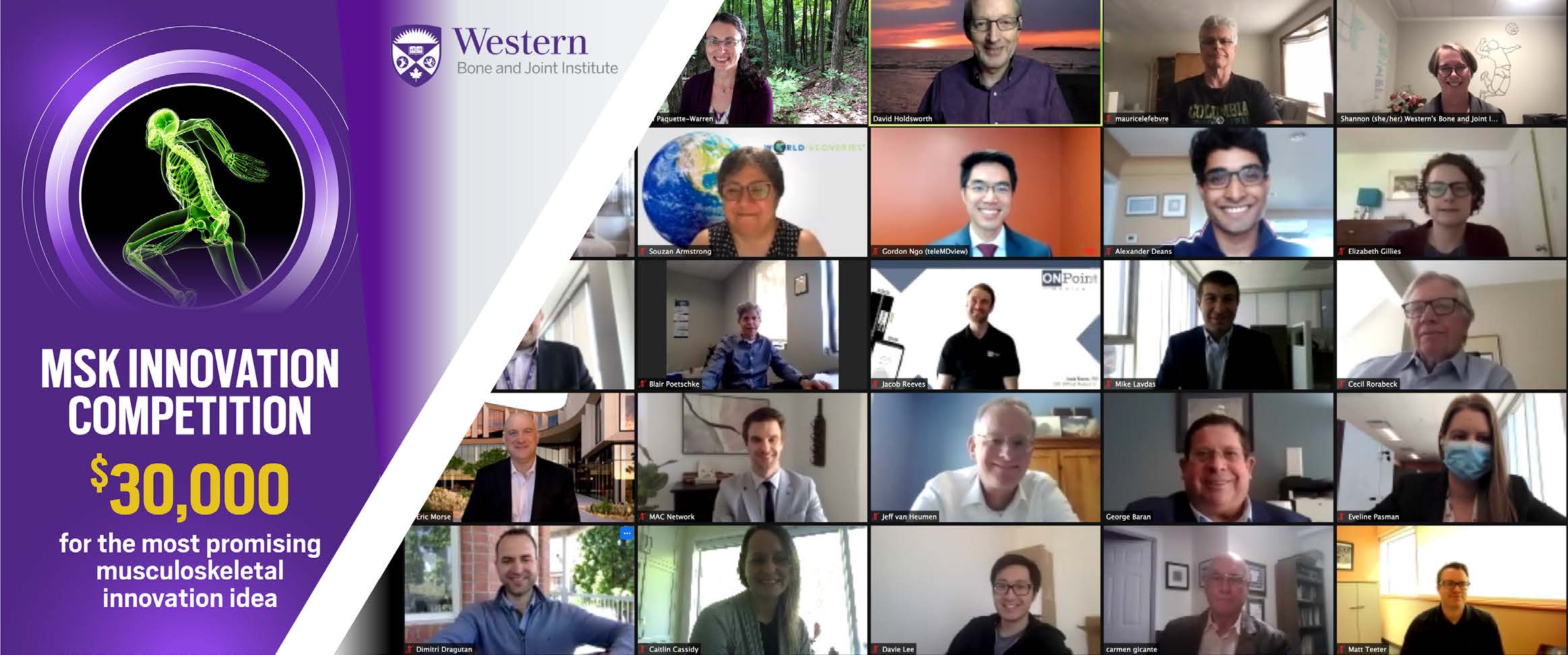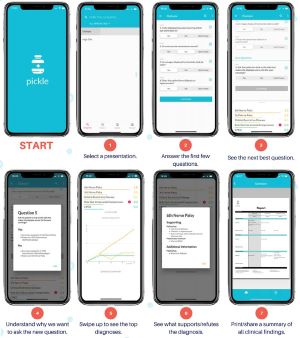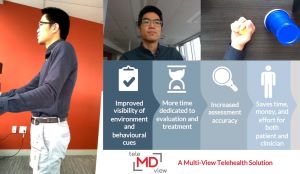Two MSK Innovation Competition winners are using technology to revolutionize primary care

Two companies are set to make revolutionary impacts on diagnosing musculoskeletal (MSK) diseases, resulting in better and more accessible care.
With mentoring and financial support from the Bone & Joint Institute’s MSK Innovation Competition, Pickle and teleMDview are close to commercializing innovative tech-based diagnostic solutions. The competition, created by the BJI in partnership with the Morrissette Institute for Entrepreneurship at Western’s Ivey Business School, is designed to enhance, support and celebrate entrepreneurship and the commercialization of MSK innovations. Entrepreneurial MSK experts based in London are invited to participate in the five-stage event that includes a workshop, initial proposal, team selection, mentorship and a final pitch to a panel of judges. The annual event offers a Grand Prize of $30,000 to the team with the best pitch. This year, a runner-up prize of $5,000 was added to support a second team that showed great promise.
Using AI to help family physicians in a “pickle”
 Pickle is an app-based diagnostic decision aid for MSK complaints that took the Grand Prize at this year’s competition. Developed by Alex Deans, a second-year medical student at Schulich School of Medicine & Dentistry at Western University, the app is designed to help primary care physicians, such as family doctors, if they felt they were in a “pickle” while diagnosing a patient.
Pickle is an app-based diagnostic decision aid for MSK complaints that took the Grand Prize at this year’s competition. Developed by Alex Deans, a second-year medical student at Schulich School of Medicine & Dentistry at Western University, the app is designed to help primary care physicians, such as family doctors, if they felt they were in a “pickle” while diagnosing a patient.
With team members Dr. Caitlin Cassidy and Dr. Steven Macaluso, Deans used their collective experience working in family medicine clinics to select the three most common issues physicians deal with — back and neck pain, shoulder pain and knee pain — and created a system of algorithms to help narrow down the potential causes and develop an informed diagnosis.
The app uses artificial intelligence (AI) to find the highest yield of the potential diseases and provides the family physician with the most likely problem. The system helps to rule out certain conditions and provides more information to support the diagnosis, along with a report for specialist referrals.
Deans has an undergraduate degree in Chemical Engineering and developed technology for people with blindness when he was 14 years old. He “found his feet” in medicine through further work with Chevrolet and VIA Rail.
The mentorship aspect of the MSK Innovation Competition was a key advantage for Deans. “We were partnered with John Galbraith, Senior Director, Venture Growth & Corporate Innovation at TechAlliance,” says Deans. “We were able to focus on how to communicate the idea clearly. He was able to help me transition from talking about technology to why this is important and meaningful for each physician. His advice and insight were so valuable.”
Galbraith, an expert in B2B and software, started with an analysis including the journey of developing Pickle and the real value and reason that doctors could be engaged.
“What makes a good mentorship relationship is staying out of an entrepreneur’s way,” says Galbraith. “When you meet someone like Alex and you know how far they’ve come on their own, you work with them to bring it all together and tell the story.”
“As part of TechAlliance, I was thrilled to help,” says Galbraith. “We approach our entrepreneur ecosystem with an abundance mindset — so this is what we do. We venture to support entrepreneurship at scale. It’s my job to meet entrepreneurs where they are, identify gaps & long-term goals and figure out how we get them where they need to be.”
Providing a new and different perspective to rehabilitation care
teleMDview’s multidisciplinary team (2021 Runner-up) is bringing interactive healthcare to telehealth solutions with the Simultaneous Multi-View System for Virtual MSK Health Interactions. They have developed a “plug and play” camera system designed for physicians to use with their patients remotely.
 The lunchbox-sized system comes with three cameras that can be mounted on tripods. The system provides three different angles of the patients so physicians can assess MSK diseases from different perspectives at the same time.
The lunchbox-sized system comes with three cameras that can be mounted on tripods. The system provides three different angles of the patients so physicians can assess MSK diseases from different perspectives at the same time.
The multidisciplinary team includes Chief Technology Officer, Resident Physician and Medical Innovation Fellow, Gordon Ngo; Chief Medical Officer and Medical Innovation Fellow, Sheyla Abdic; CEO and Medical Innovation Fellow, Sherif Abdou; and COO and Medical Innovation Fellow, Kirill Fedorov. The team started their collaboration with a speech therapist at Parkwood Hospital and went on to interview 40 people, including occupational and speech therapists in various provinces, to develop the multi-camera diagnostic system.
The goal is to streamline assessments and give therapists the opportunity to provide a greater volume of therapeutic interventions remotely, as well as making rehabilitation care more accessible.
“I’m an MSK rehab physician and an engineer, so I really want there to be a growing interdisciplinary collaboration,” says Ngo. “Participating in the MSK Innovation Comp process was an exciting opportunity to see this in action. Our team is already an interdisciplinary team, including physicians, kinesiologists and engineers, including biomedical engineering. We felt that this process was valuable in developing relationships with clinicians in London.”
Blair Poetschke, President, Scintica Instrumentation Inc., the assigned mentor for the teleMDview team, agreed on the value of the process. “Creating a culture of entrepreneurship among our academic scientists is critical to Canada’s future economy,” says Poetschke. “The MSK Innovation Competition is a great example of how we can make this happen.” Over the past 25 years, Poetschke has founded three separate life sciences manufacturing companies, developing them into successful global businesses.
That global industry experience combined with an MBA in International Business and a passion for start-ups made him the right mentor for the teleMDview team.
“Working with energetic scientists who have the enthusiasm to implement their ideas was very rewarding,” said Poetschke. “The team’s ability and interest to learn about structuring business plans and investor pitches was exceptional and will be a skill they can use over many years to come.”

